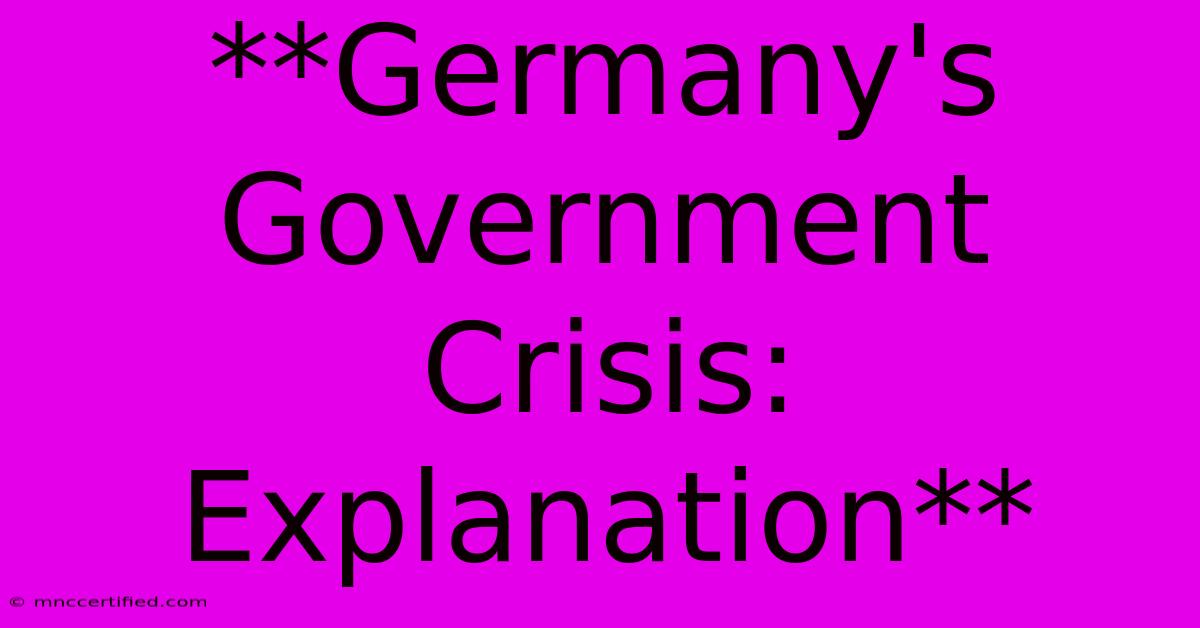**Germany's Government Crisis: Explanation**

Table of Contents
Germany's Government Crisis: An Explanation
Germany, known for its stability and strong political institutions, is currently facing a significant government crisis. This crisis, triggered by the resignation of Interior Minister Nancy Faeser and the subsequent fallout, has shaken the country's political landscape. Understanding the complexities of this situation requires delving into its roots and exploring its potential implications.
The Spark: Faeser's Resignation
The crisis began with the unexpected resignation of Nancy Faeser, a member of the Social Democratic Party (SPD) and the influential Interior Minister. Faeser, who oversaw crucial aspects of security, immigration, and policing, stepped down citing personal reasons. However, speculation quickly emerged regarding a deeper rift within the governing coalition.
Cracks in the Coalition: SPD, Greens, and FDP
The current German government is a three-party coalition formed by the SPD, the Green Party, and the Free Democratic Party (FDP). This unusual alliance, forged after the 2021 election, was designed to provide stability and a broad spectrum of perspectives. However, it has been facing increasing internal tensions.
Faeser's departure highlighted the growing discord between the SPD and the Green Party on key issues such as:
- Climate Policy: The Greens, known for their environmental focus, are pushing for more aggressive climate action. However, the SPD, representing a more pragmatic approach, has resisted some of these measures due to their potential economic impact.
- Immigration: The Green Party supports a more welcoming immigration policy, while the SPD, concerned about public sentiment, favors a more restrictive approach.
- Security: The Greens have advocated for a more multilateral approach to security, while the SPD, traditionally prioritizing domestic security, has taken a more assertive stance on certain issues.
These disagreements have created a climate of distrust within the coalition, making it difficult to find common ground on crucial policy decisions.
Implications of the Crisis
The ongoing crisis poses significant challenges for Germany:
- Political Instability: The resignation and the internal disagreements threaten the stability of the current government, potentially leading to early elections.
- Policy Gridlock: The lack of consensus within the coalition could further hinder progress on critical issues such as climate change, immigration, and economic policy.
- International Reputation: The ongoing crisis might cast a shadow on Germany's reputation as a stable and reliable partner on the global stage.
Looking Ahead: Solutions and Challenges
While the crisis has heightened political uncertainty, finding a solution requires a concerted effort from all parties involved:
- Compromise and Dialogue: The coalition partners must engage in open and honest dialogue to bridge their differences and find common ground on key policy issues.
- Leadership and Transparency: The leadership of the coalition parties needs to demonstrate strong leadership and transparency in their decision-making processes.
- Public Trust: Rebuilding public trust in the government will be crucial to navigating the challenges ahead.
The German government crisis is a complex situation with far-reaching consequences. The ability to navigate this turbulent period will depend on the willingness of the coalition partners to compromise, the leadership of their respective parties, and the public's trust in the democratic process.
This article serves as a starting point for understanding the current situation. It is essential to stay updated on the evolving dynamics and potential developments within the German political landscape.

Thank you for visiting our website wich cover about **Germany's Government Crisis: Explanation**. We hope the information provided has been useful to you. Feel free to contact us if you have any questions or need further assistance. See you next time and dont miss to bookmark.
Featured Posts
-
Kimmel Fires Back At Musks Propaganda Label
Nov 08, 2024
-
Eddie Redmayne Beyond The Familiar
Nov 08, 2024
-
Fed Chair Powell No Firing By Trump
Nov 08, 2024
-
Fiorella Insurance Agency Inc Stuart Fl
Nov 08, 2024
-
Hail Damage Roof Insurance Claim Process
Nov 08, 2024